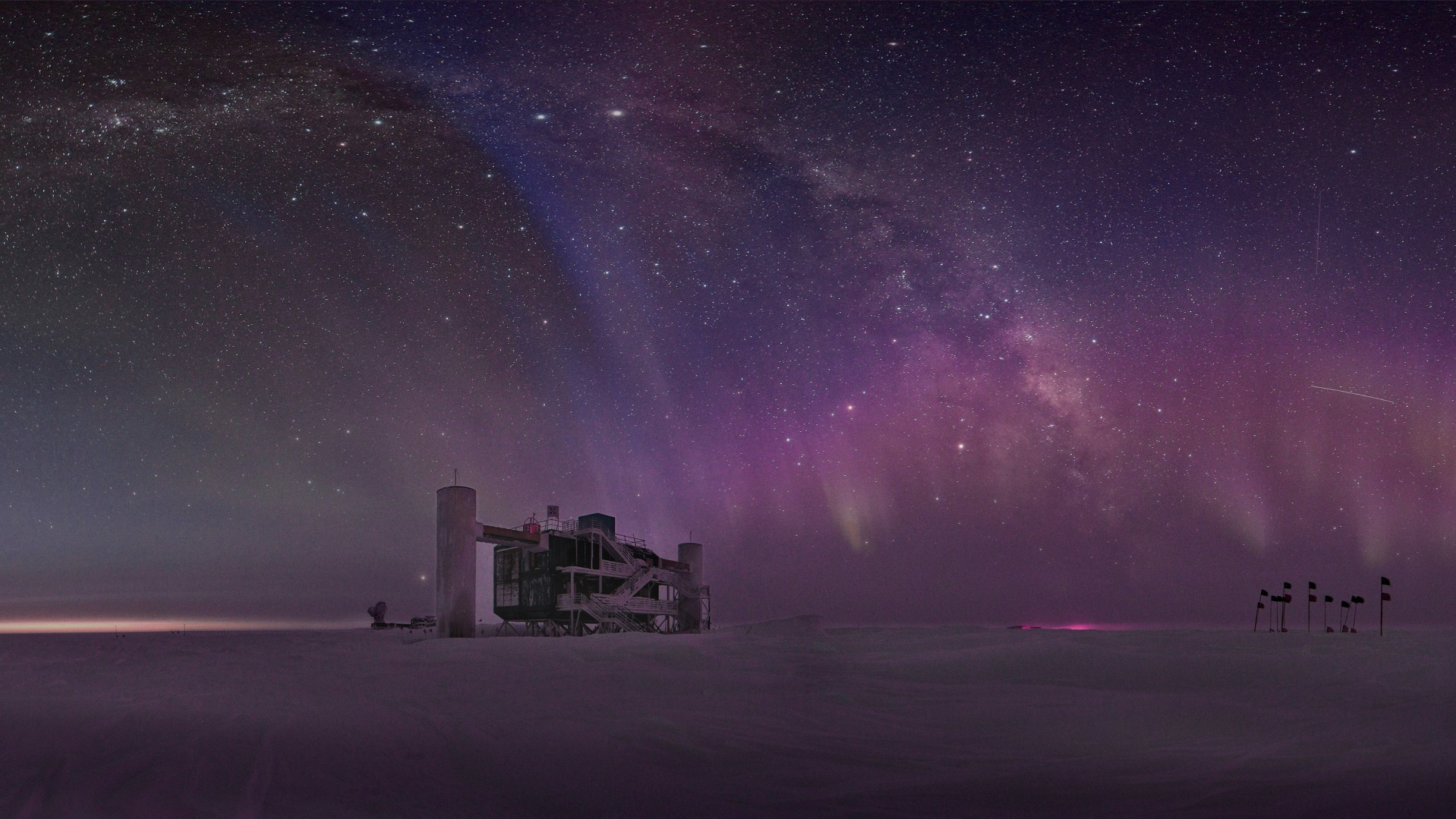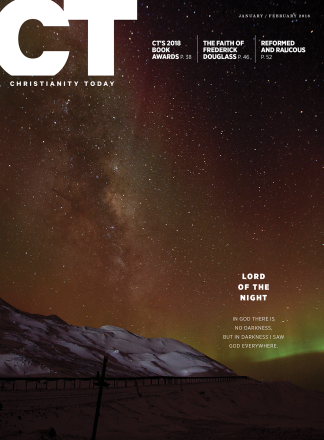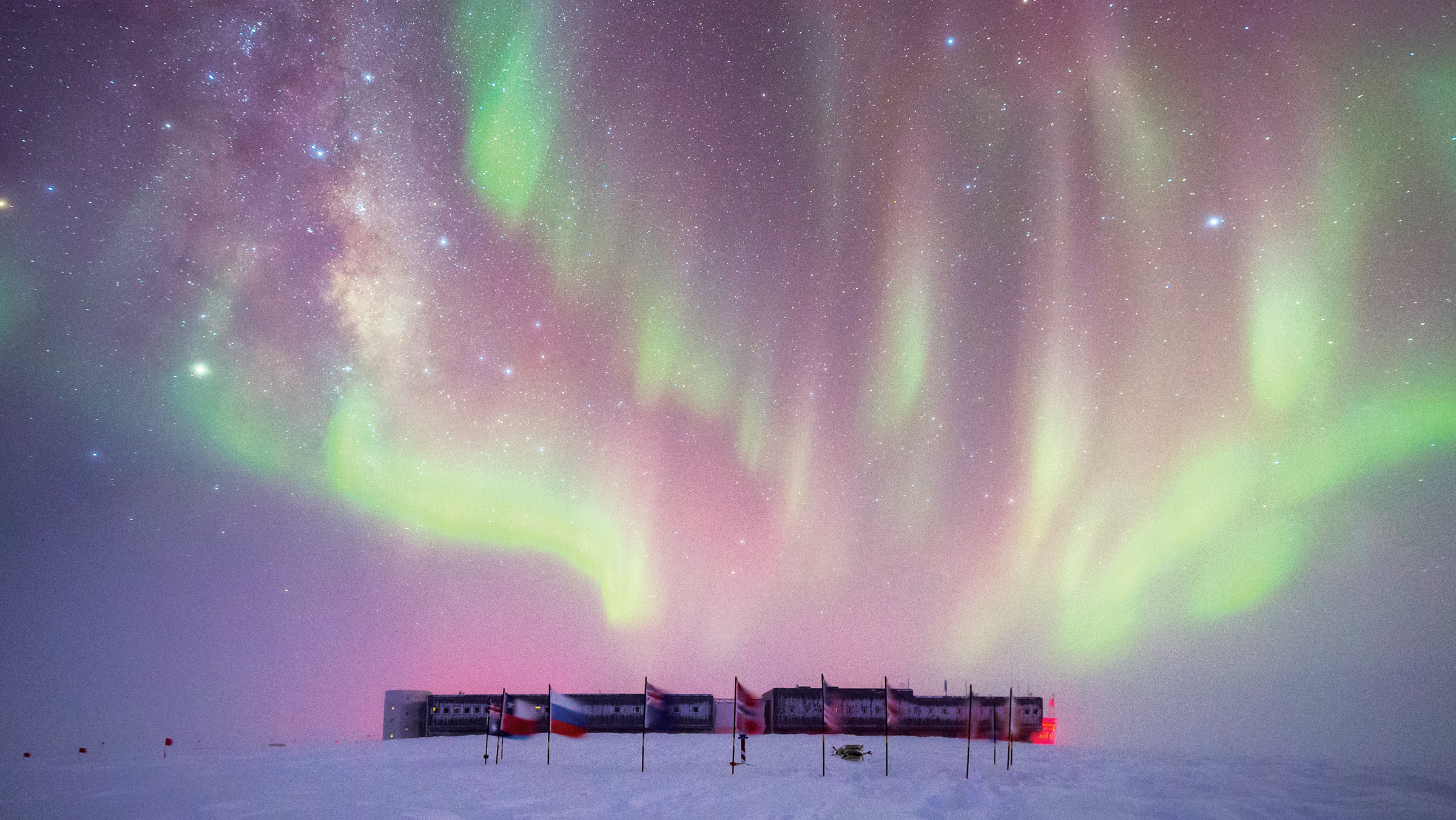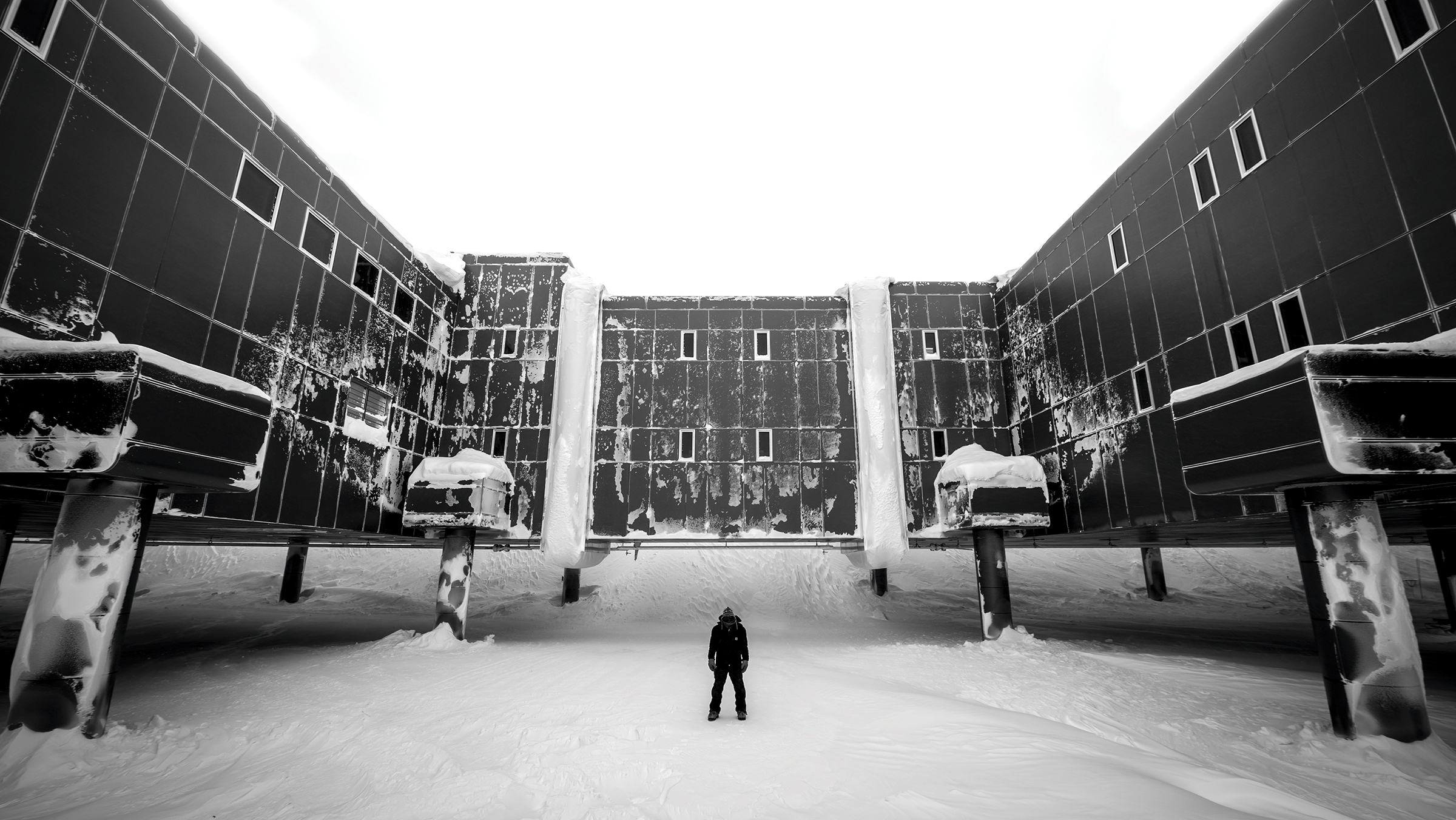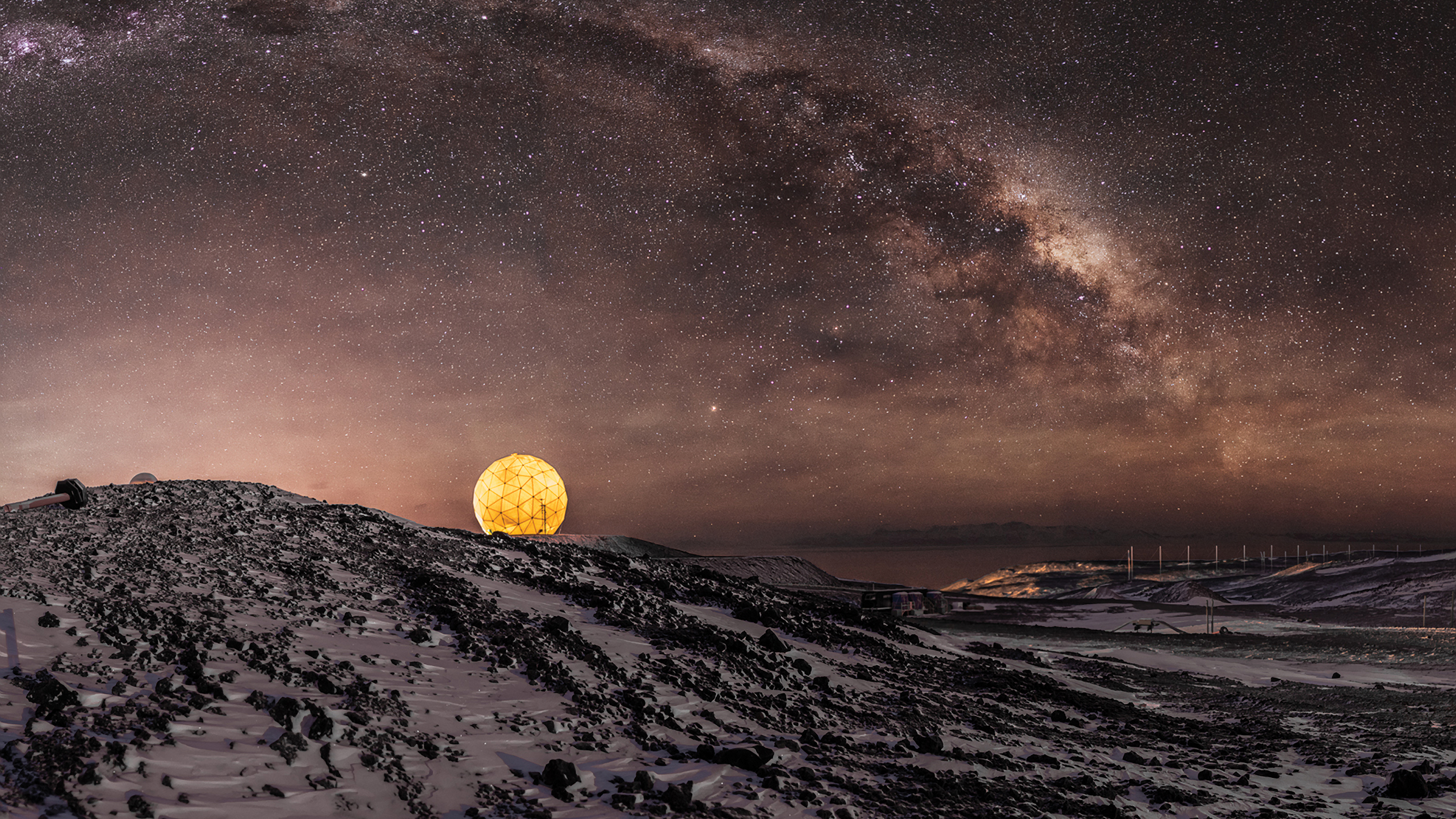The Amundsen-Scott South Pole Station sits upon two miles of glacial ice at the bottom of the world. It is one of the remotest places on the planet, more than 800 miles from the nearest human beings.
A small group of people gathers here to support scientific research done by the United States Antarctic Program. America has had a presence at the South Pole since 1956, and today scientists take advantage of its unique environment and geography to study things like astronomy, neutrinos, seismology, and the climate in ways impossible anywhere else. Researchers depend on more than a few support staff for their work. So during the summer, when the sun shines on the South Pole for days on end, the population can soar to over 150 people. It’s a teeming metropolis compared to the fewer than 50 who hunker down in the long, sunless winter months.
I’m one of them, commissioned as a missionary to the others.
There are no permanent residents of Antarctica. People here live and work temporarily on one of the almost 50 research stations—plus summer-only research camps—representing more than 30 countries (the United States boasts three permanent stations). The stations look like futuristic pods that might easily be imagined on the surface of the moon or Mars. Workers are hired for specific durations and eventually must leave.
I followed my wife’s dreams to the South Pole. A doctor, Sarah learned of the Antarctic program in college and it became a life goal to work here. I, too, grew fascinated with coming to Antarctica, though my training in Christian ministry did not exactly open many doors.
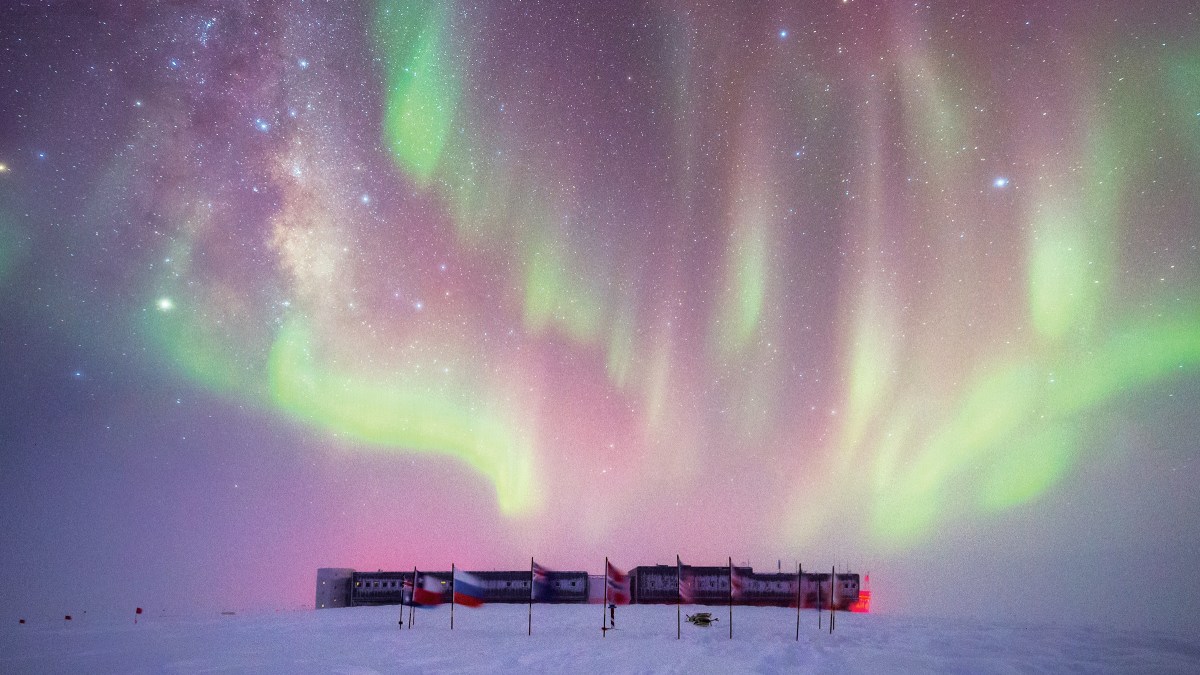
After a long journey involving many job applications and a gallbladder removal to physically qualify, I finally landed a position as a “materials person,” a logistics guy who essentially shuttles supplies from point A to point B and spends a lot of time outside. The assignment meant we would winter at the South Pole for the 2017 season, from January to November.
I’m no scientist, but what I’ve learned during the longest night of my life here is deeper than empirical data. I expected—or hypothesized, if you will—that isolation and six months of darkness would deeply rattle the spiritual lives of Christians and others living here. The more I talked with others and analyzed my own experiences, however, I discovered the exact opposite.
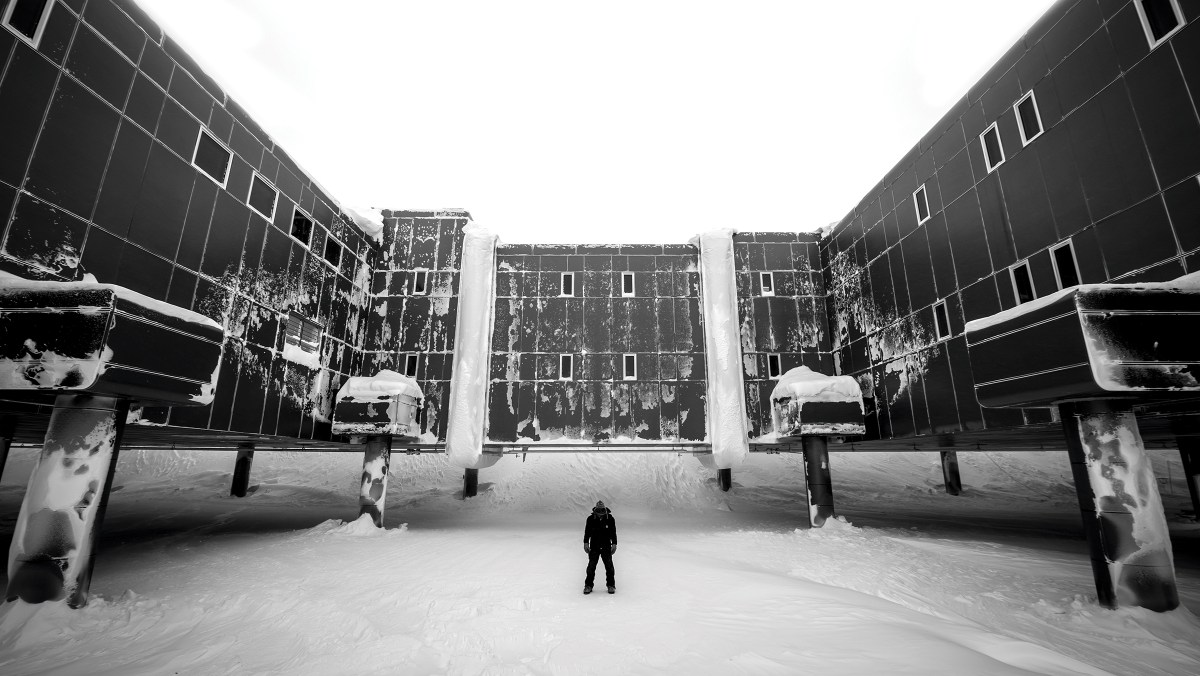
What hold do isolation and darkness have over one who proclaims Christ? On the contrary, what other experience could so uniquely draw us close to the one who suffered history’s darkest and loneliest hour?
The Blessing of Solitude
Life at the South Pole is lived aloft. Our station sits on stilts roughly 20 feet above the ice, to stay above accumulating snow. It is divided into three sections: living quarters, work spaces, and recreational areas. Berthing rooms, as they are called, are small and meet only the basic requirements of a living space. Meals and events happen in community rooms.
While you may meet the occasional passerby walking from one section of the station to another during the winter months, it is not uncommon to feel as though the building is deserted. As I type these words, I am sitting alone in a computer lab designed for 20 people.
Stepping outside into 90 degrees below zero Fahrenheit with an average 30-degree wind chill is daunting. But every moment in the wild I feel God’s overwhelming presence as I’m made aware of his transcendence.
There are plenty of opportunities to be involved with our small community, but many people withdraw. The habit becomes more pervasive as the winter drags on. By the afternoon, many in our community are simply tapped. They escape to rooms or other personal spaces to recharge for another day.
I am fortunate to have my wife with me. The strength I draw from sharing this experience with a loved one (and my best friend) is immeasurable. There are certainly moments when we spend beneficial time apart, but we can always fall back on one another if we tire of the community—which is thankfully quite rare. We have a fantastic and enjoyable group of people here; furthermore, we’re here to be present and earn the right to talk with them about faith.
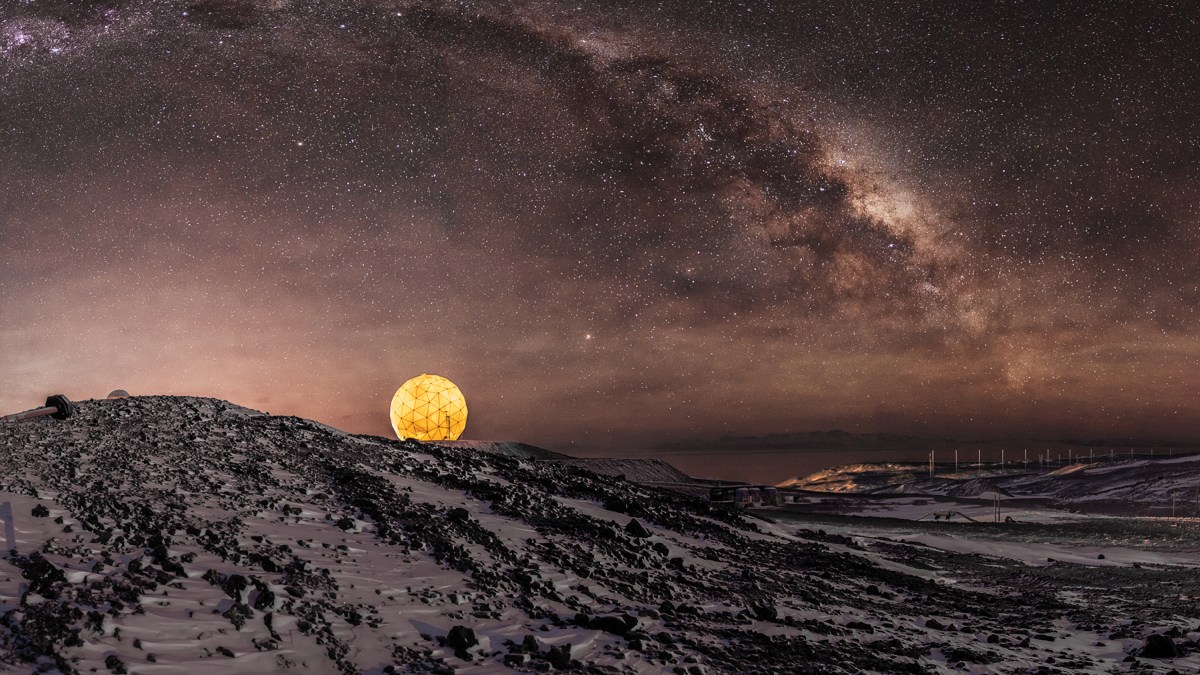
I work in the substation, a large structure built from a series of arches and commonly buried in 30 feet of snow and ice (it sits only a few feet above the ice tunnels that run underneath the entire Amundsen-Scott station and house pipes and utilities). My “office” is connected to the elevated station by a giant stairwell.
Though I can walk inside for my short commute to work, I make a concerted effort to take the slightly longer outdoor route. These daily walks have been some of my most consistent moments of seclusion—a special time of prayer, pausing to consider the frozen landscape and fortifying my spiritual welfare as I prepare for work.
Not everyone’s job allows them much time outside during the Antarctic winter. I’m thankful mine does. Had I not wandered so often in the darkness with only a headlamp, I might not have leaned into our intense isolation from the rest of the world. In the summer, when the sun is shining across the vast ocean of ice surrounding us, it is easy to see this immense continent. Walking in the dark of winter, however, I feel the reality of being alone in a relentless environment.
You would expect that extreme isolation at the South Pole—separation from family, lack of normal community, major lifestyle changes—would be one of the most difficult experiences for modern humans. I did. Workers here must pass a psychological evaluation of their readiness to cope with the stresses of the environment.
I should have known better. Christ frequently withdrew to desolate places, often at night. So while our environment elicits plenty of side effects and moments of tension over time, Christians especially here have leaned into, instead of away from, the solitude.
Believers have been pursuing seclusion to strengthen or amplify their faith since the church’s earliest centuries. I am reminded of Antony of Egypt, a fourth-century Christian known as the father of monasticism. While he initially withdrew to the desert to be alone, he quickly attracted a community and taught others how to use isolation as a spiritual discipline, how to lean into the seeming harshness of solitude.
None of the Christians here feel called to spend the rest of their lives in the desert, whether in Egypt or in Antarctica (it is technically a desert, with little precipitation). But it is impossible to deny the benefits of a season set apart. If anything, it would help to remove a few more of the amenities here, at least if a goal of coming to Antarctica were fostering spiritual growth.
In the modern, non-Antarctic world, it can be difficult to find places to be alone. We are surrounded by real and virtual community throughout good portions of our days. When we do need to set apart moments of meditation with our God, knowing how to handle stillness can be almost as challenging as finding it.
Shaped by Solitude
The deserts and wildernesses of the Bible are not only places of retreat and devotion. They are also places of exile, wandering, and waiting. John is one of the men on the station who attends our church service. He is a believer in Christ and has become a good friend. John has shared with me, in faltering tones, about his marriage of 25 years that deteriorated prior to him coming here and his crippling inability to do anything to save it. His relationship with his adult children has suffered and is not what he hoped it would be.
“I have spent years trying to figure out the hows and the whys but just could never wrap my mind around it, or even begin to explain why,” he told me recently, a glimmer of hope in his eyes. Time alone at the South Pole has helped him “to think differently, to know that it wasn’t all me. I certainly know that I played a part in it; it was a relationship, after all.”
Solitude has helped to remove John, who in the context of our scientific community refers to God as “a higher power,” from a desperately painful situation. From our vantage point, he can “understand that I will never understand why and to try and let it go. To understand that it will just take time to heal.”
“My personal relationship with my higher power has grown over this painful time,” he said. “Someday soon the healing will take over the pain. When I get back home, I will be ready to start a new life.”
John’s story reminds me of Jacob’s transition in Genesis 32, as he prepared to return with his family to a homeland he had fled so long ago. When we leave Antarctica, John will reluctantly leave the safety of a wilderness that has protected him, and yet he cannot find healing until he goes home. Just as Jacob had no idea what to expect when he reunited with his brother Esau, John looks to an equally unpredictable future.
John is excited about leaving, but there is a palpable tension as he looks toward the relational uncertainties he will confront back home. He is clinging to the same hope I believe Jacob must have had, the hope of a God of new beginnings who is bigger than any situation we face.
Another of my Christian coworkers does not feel the darkness has had any real effect on his faith, but like John, he senses a benefit to the extreme isolation.
“I don’t think my faith has changed, per se,” he said. “We should always be growing as brothers and sisters in the church body, but time in isolation has and will always be a part of that growth too. For some people, that can be as conscientious as taking time out of your day to pray. For people like me, people more hardheaded, literal isolation is actually an easier way to take that time. Being at the South Pole makes practicing the meditative part of my faith easier.”
Whispers in the Dark
My best moments during the winter here, though they regrettably have to be limited, are spent walking outside where isolation and darkness meet.
I pause to reflect on God’s vast infiniteness, gazing at a crystal-clear view of the Milky Way and at constellations invisible back home. Stepping outside into 90 degrees below zero Fahrenheit with an average 30-degree wind chill is daunting, but every moment in the wild I feel God’s overwhelming presence as I’m made aware of his transcendence.
Two of our fellow winter-termers taught a class on astronomy. At the end of the class, we spent our final evening outside while the instructor talked about the various stellar objects visible from the South Pole. My wife and I huddled close to stay warm, gazing into a work of God that seemed unknowable apart from the mysterious night sky—glimpses of his infiniteness, beauty, love, and goodness.
There was comfort, knowing that the God of moon pillars, of auroras, and of the still small voice would be waiting for me in everyday life back home.
I enjoy learning about the sciences that explore the vastness of space. But the more I learn, the more I see the intricate hand of God weaving the tapestry of the sky. One person on the station told me it was absurd amid all of this infinite wonder to believe in a God who would be bothered with such an inconsequential planet, let alone the people on it. Gazing into the unbridled magnificence of our galaxy, however, I felt anything but irrelevant to God. Quite the opposite. I felt God’s tender grasp.
Yet for all the celestial grandeur on display at the South Pole, God mostly speaks here in a still, small voice. After a few months, I found myself oddly comfortable with the night. The psalmist tells us the day belongs to God, as does the night (74:16). There was a peace in the dark I had never noticed before, as if God were whispering, “Yes, I am Lord of all creation and I am here in the darkest of nights. It was I who separated the night from the day.”
In the dark, I would recall verses like Psalm 42:8: “By the day the Lord directs his love, at night his song is with me—a prayer to the God of my life.” I would praise the Creator in each step, bathing my time here and the people around me in prayer.
Another favorite passage of mine is from 1 John 1:5: “God is light, and in him there is no darkness at all.” Interestingly, though, there is no lack of God in the darkness. We all know this deep down. We know God is Lord of everything, yet darkness has always been home to uncertainty and fear. A number of horror movies are set in the South Pole during winter. Most great horror stories, in fact, play on our dread of what lies just beyond the light.
But in Antarctica’s darkness, I’ve found our Creator is present and more powerful than almost anywhere else I’ve been. In truth, the night belongs to the Lord. And I have learned to walk in the night with the knowledge that the light is present with me.
The most unique of my outdoor experiences at the South Pole has been standing beneath the aurora australis. Even with a scientific understanding of what causes this phenomenon, it is easy to stand in awe of a Creator who moves beyond simple function and into indescribable beauty—it is entirely possible God is doing both at the same time. Watching as wild green curtains dance above a barren and inhospitable landscape, one cannot help but wonder if God reserves some of the more marvelous masterpieces for the few who strive to the furthest corners of this world.
Watching haunting green waves work a masterpiece in the winter sky is breathtaking. Knowing it is caused by flares from the surface of the sun does not remove the awe and wonder I have for a God whose ways are not my own. I’ve committed years of my life to studying and knowing God, and yet a few moments of beholding the southern lights remind me how dimly I see and understand the Lord.
I once saw what is called a moon pillar, a rare phenomenon that happens only when there are ice crystals in the air. Light from the moon reflects off the airborne crystals to form light pillars spreading away from the moon. I saw only two distinct moon pillars, and one of them formed a perfect cross. While I might have been the only person on the station who saw this phenomenon as a symbol of God’s presence and grace, it was an extraordinary experience.
A Community in Isolation
Our faith community at the South Pole is small. There is no church or chapel. Five of us meet in a large conference room for our Sunday service, with occasional guests who swell our number to as many as eight. We represent a wide array of views and backgrounds: Catholic, Lutheran, Episcopalian, Methodist, Baptist, non-denominational, Presbyterian, and seekers. How each individual sees their faith and God varies immensely.
During our time together, it is common for one or two people to become slightly agitated—maybe “perturbed” is a better word—with a reading from Scripture. Reading through Acts, for example, our group struggled with the deaths of Ananias and Sapphira.
“But why are the disciples telling people what to do with their money?” one of them asked. “I really don’t understand what they did wrong.”
We have authentic community where people feel comfortable expressing their concerns. It is common for one of our guys to express his sentiments succinctly, especially in his moments of wrestling with the text or my pressing him. He will simply say, “God is good.”
We can build off of his statement. After all, God is good.
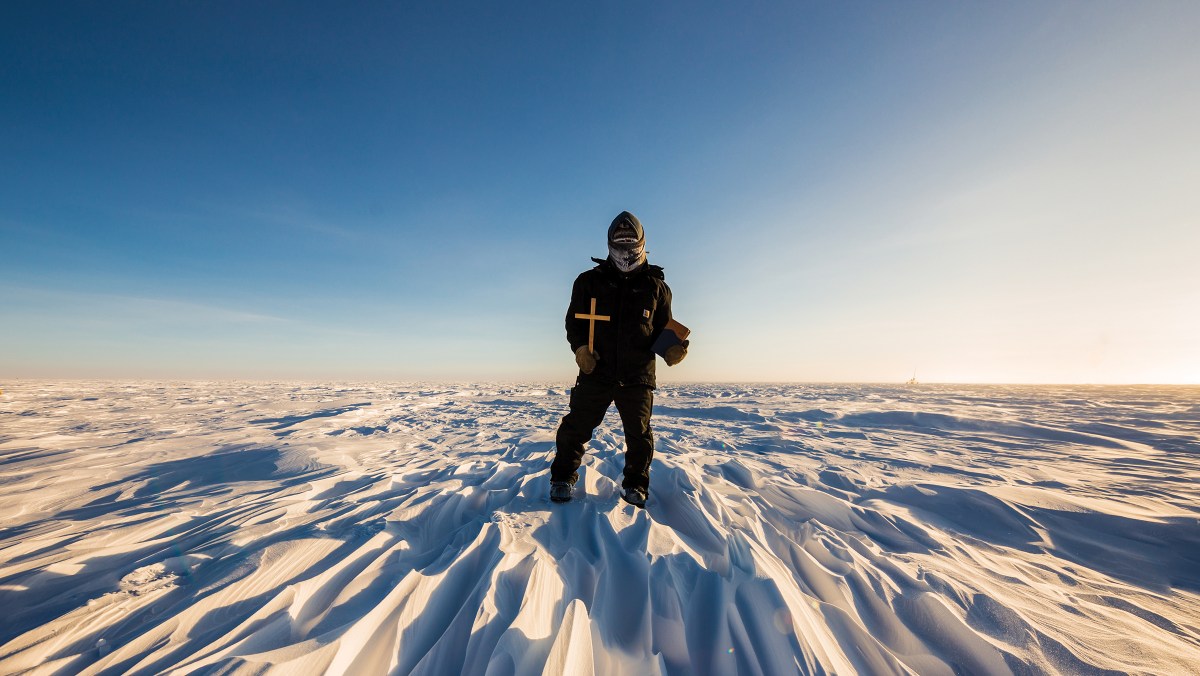
It is enigmatic to me that as I cherish the otherworldly experiences here that so forcefully remind me of the Creator, most of the people on our station just see astronomical phenomena. The gospel of Jesus Christ holds little allure for people I have talked with at the station. And yet solitude has created space for the type of open dialogue that is rare in the United States right now. I have had fascinating conversations with my colleagues about faith, Scripture, and God.
There are certainly nonbelievers having a difficult time enduring the isolation of living at the South Pole, but there are also a few who thrive in this environment. For some, the love of the night sky makes living here a preferred spot. Others enjoy the simplicity away from the normal distractions of modern life. The foundations they lean on for support are more temporal than mine, but they have found they seem to work, at least most of the time.
That said, all of our conversations on religion and belief systems have been respectful and thought-provoking. People have been willing to dialogue, to learn even while questioning my beliefs. Several strong relationships have formed. I am sure many of these relationships will last long beyond our time at the South Pole, and I’m confident God will allow future conversations to be continued tools for redeeming lives.
Sunrise
In September, the sun finally started throwing its rays of light around the bends of the earth, though we could not actually see the sun itself. Then in October, the sun suddenly appeared again over the horizon, ending half a year of unbroken darkness ameliorated only by moonlight.
There was intense rejoicing on the station, not least because the sunrise signaled that planes would soon be returning to the station to deliver supplies and take us home. In our Sunday service, we discussed it all as a metaphor for the long night as the world awaited a messiah. Except for during my first year as a believer, I have never had such a moving Easter experience.
While I felt a sense of regret at the loss of our night sky, my own feelings were overshadowed by the sun’s arrival, so tangibly evident to the entire community after so long an absence. At that moment I knew I would feel real loss at leaving the South Pole. But there was also comfort, knowing that the God of moon pillars, of auroras, and of the still small voice would be waiting for me in everyday life back home.
Brett Baddorf lived at the South Pole as a missionary for Hope Church in Cordova, Tennessee. He has worked as a youth minister for more than ten years and a collegiate minister for three. He and his wife, Sarah, returned to Tennessee in November 2017. He blogs at whyeveryoneshouldmovetonewzealand.blogspot.com.
Did this story resonate with you? Let us know here.

